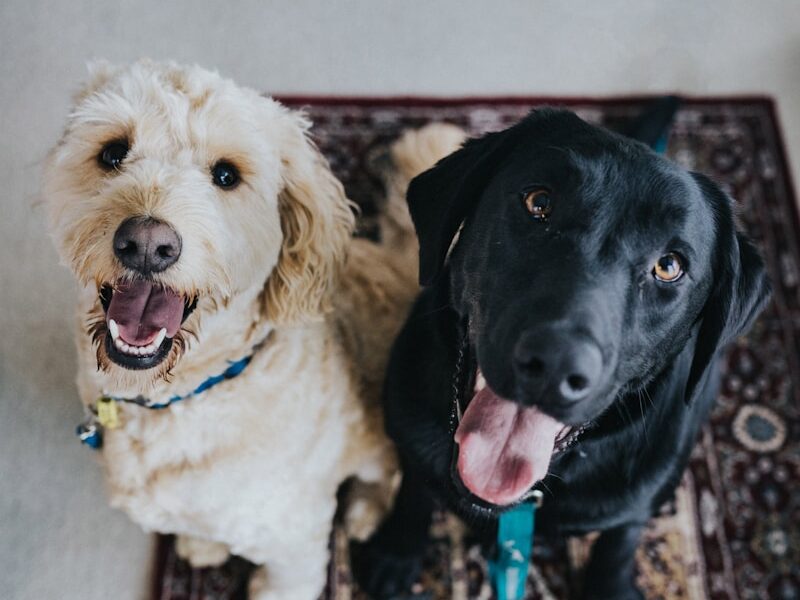15 Reasons Why Your Dog Is Barking Nonstop at Night

Does your dog’s nonstop barking in the dead of night leave you feeling completely wiped out? Different types of barking usually mean different things, so step one is figuring out what’s behind it. Let’s dive into 15 reasons your pup might be barking all night long and how you can help them (and yourself) get some peace.
Wildlife

Wild animals passing by can easily grab a dog’s attention and set off a barking spree at night. This is especially common for dogs in areas teeming with wildlife or ones with a strong prey drive. If you’re out in the countryside, your dog will make sure you know every time a hare, deer, or even an elk is wandering nearby or passing through.
Outside Noise

Dogs have crazy good hearing and can pick up on sounds we’d totally miss. Noises like a car door slamming in the distance, a late-night snowplow, an early morning garbage truck, or even a far-off thunderstorm can mess with their sleep and set them off barking. Some pups are extra sensitive to noise and seem to be on high alert, reacting to even the tiniest sounds.
Noise Indoor

If you’ve got a house full of pets, it’s totally normal for your dog to start barking when one of the others is up and moving around at night. In homes with multiple furry friends, dawn can turn into a full-blown energy fest, with zoomies taking over—pets running like maniacs, chasing each other, and leaping around like the floor is on fire.
Alarm

Dogs are acutely aware of everything happening around them and can totally sense when something’s off. At night, when it’s quiet and still, even the smallest noise or movement can catch their attention. If they hear a weird sound or spot something that seems sketchy, they’ll start barking to get your attention.
Other Dogs Barking

When your dog hears the neighborhood dogs going off, they might feel like they have a chime in or bark back. It could be their way of saying, “This is my turf!” joining the barking squad, or just trying to shut the other dogs up. Some breeds are just naturally more bark-happy—like herding dogs, scenthounds, and those little dogs who act like they run the show.
Territorial

Some dogs bark at night to guard their space or things they care about. For example, your dog might bark to keep others away from her bed or sleeping spot if she’s not in the mood to share. If your other dog gets too close while she’s resting, she might bark to make sure no one messes with her space.
Warning

We’ve all heard those stories about dogs who bark in the middle of the night to warn their owners—whether it’s a fire, a super dangerous snake, or a baby in distress. Some service dogs are even trained to do this. For example, Colt, the Weimaraner-Lab mix, would bark and jump to alert his owner up to two hours before she was about to have a seizure.
Anxiety

Dogs are social creatures, and they usually prefer to sleep with their owners or other pets instead of being left alone. On the flip side, if you’ve brought home a new puppy or adopted an adult rescue dog, she might bark at night because she’s feeling anxious about the big change (that she didn’t have a say in) and isn’t sure if she’s safe yet.
Fear

Some dogs bark at night because they’re scared of loud noises, unfamiliar people or animals, or even the darkness and shadows. Fearful barking is often paired with other signs of fear, like hiding, trembling, or panting. Ever notice how your dog acts all freaked out on the 4th of July? That’s because the sound of fireworks scares them out.
Attention Seeking

Some dogs bark at night just to get a little attention from their owners. This can get worse if you give in and get up to shower your pup with love every time they bark. While ignoring this kind of barking is usually the best move (and there’s plenty of advice out there saying exactly that), you have to make sure that’s really the reason your dog’s barking at night first.
Deaf and Blind Dogs

Deaf and blind dogs bark for many of the same reasons as dogs that can see and hear, but they might get a little confused if they wake up in the middle of the night. This can make them anxious, so they might bark to check in with their owner for reassurance. Deaf dogs, especially, might bark louder or make all kinds of sounds since they don’t know how loud or what it sounds like.
Discomfort

If your dog’s feeling off—like she’s hungry, too hot or cold, needs to go out, or just doesn’t feel well—she might bark to let you know something’s wrong. The barking might be pretty quiet here and there, or it could get more constant if she’s still uncomfortable. Dogs might need bathroom breaks at night, especially if you’ve got a young pup or a newly adopted rescue dog who’s still adjusting to home life.
Boredom

Dogs might bark because they’re bored, especially if they’re left alone for a long time. For example, if you like to sleep in on the weekends but your dog’s used to you getting up at your usual time, she’ll be waiting for you. She knows it’s time for a walk, breakfast, and to see her favorite person. When you don’t show up on time, she might get bored waiting and start barking to try and speed things up.
Frustration

Dogs who are left waiting for you to get out of bed and let them outside or feed them might start barking out of pure frustration. They may also bark during the night for the same reasons, like when they can’t get to something they want or are stopped from doing something they’d love to do. For example, your pup might bark at people or animals outside she wants to interact with but can’t.
Pain

Your dog may bark at night if she’s in pain. This could be from stuff like joint pain, arthritis, an injury, or just not feeling well. Watch for signs like limping or struggling to move. You might also notice other things, like being super tired, not eating, being less active, or acting off. If you think your dog’s in pain or see anything weird, it’s a good idea to take her to the vet.





